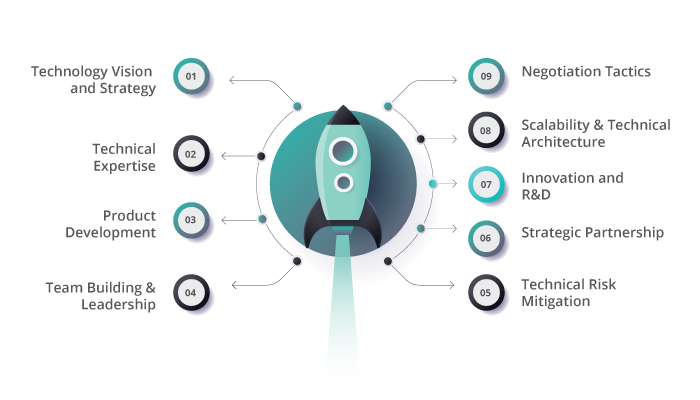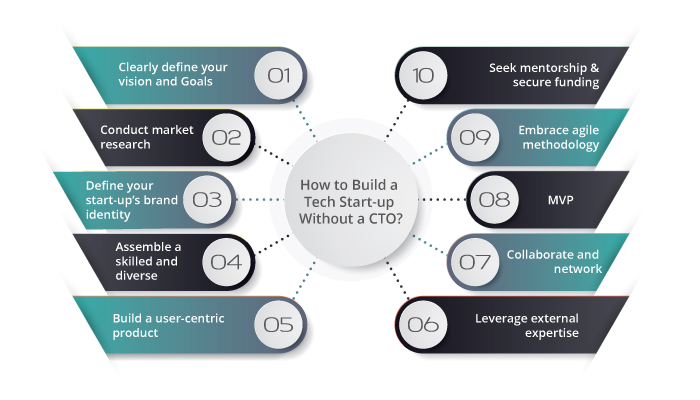Wondering how to start a tech start-up Without CTO? Yes, it is possible!
Today, we live in a constantly evolving era of tech start-ups and CTO is often considered a crucial element for success. This is why the demand for tech guys increases but there is still a skill gap in the market.
It seems daunting to start tech start-ups without a Chief technology officer. As not every budding entrepreneur has the luxury of a dedicated CTO from the outset.
Lucky those who have the best tech guy from the start. Don’t worry the good news is that it is possible to turn your ground-breaking tech idea into a thriving start-up even without a CTO.
A great tech start-up is not defined by the presence of a CTO but by the collective passion, dedication, and resourcefulness of its team.
The report shows that the China and USA have the highest number of unicorns worldwide, but the most popular one is Latin America.
Most of the start-ups don’t engage with CTO in the early stages as it might not be the best idea. It dramatically increases the cost of hiring which is a pain in the early stages.
Moreover, it takes time to find the right one, and comes with HEFTY PRICE.
While a CTO brings unique technical expertise and strategic guidance, we’ll discuss essential steps that bring your tech start-up to life, even in the absence of a dedicated CTO.
Let’s go!
How Can the CTO Benefit a Start-up?

Starting a tech start-up is not the cherry on the cake you have to decide the path of success in this competitive landscape to thrive in. 19.25 of the US population is involved in start-ups and they constantly look for new technologies to set the bar high of competition.
For this, a tech start-up needs a CTO that helps in creating a roadmap for the start-up. To ensure the success of a tech start-up, it all depends on the skills of the CTO.
Not only has this, a CTO played an important role by providing technical leadership, strategic guidance, and expertise.
Here are several ways a CTO can benefit a start-up
Technology Vision and Strategy
CTO helps in shaping the start-up’s technology vision and long-term strategy. They understand industry trends, identify opportunities and define the technical direction that aligns with the company’s goals.
Technical expertise
CTOs bring deep technical knowledge and experience to the start-up. Plus, they have a strong understanding of emerging technologies best practices, and development methodologies.
Product development
With every start-up tech company CTOs often see the product development process. They work closely with the product team. This ensures that the technical aspects of the product are aligned with customer needs and market demands.
Moreover, CTOs guide product roadmap, feature prioritization, and user experience to deliver high-quality products.
Team building and leadership
The benefit CTOs bring to the start-up is building and leading technical teams. They attract top talent, establish effective processes and foster a culture of innovation and collaboration.
They do this by providing mentorship, empowering their team members, and creating a positive environment.
Technical Risk Mitigation
Many tech start-ups fail at the early stages due to technical failure. CTOs reduce this risk by implementing robust infrastructure, ensuring data protecting, and developing disaster recovery plans.
Strategic partnerships
CTOs engage with external partners, including technology vendors, investors, and industry experts. They leverage their network to form strategic partnerships, collaborate on R&D and stay updated on the latest industry trends.
CTOs can open doors to new opportunities and help start-ups gain a competitive edge.
Innovation and R&D
CTOs encourage experimentation and exploring new technologies within startups. By allocating resources for research and development, conducting feasibility studies, and prototyping new ideas.
Moreover, they foster a culture of continuous learning, ensuring the start-up stays at the forefront of technological advancements.
Scalability and Technical Architecture
As the start-up grows, scalability becomes crucial. It designs scalable technical architecture that can handle increased user demand, data volume, and system complexity.
They plan for future growth, optimize performance and ensure the technology infrastructure can scale seamlessly.
Negotiation tactics
They have solid negotiation skills. As they regularly communicate with company executives, stakeholders, the HR department, and other individuals.
In start-ups, they maintain transparent communication with them in order to smoothen the process of product development.
Overall, these are the benefits of having CTOs in your tech start-up that help you build innovative and scalable solutions that drive the company’s success.
How to Build a Tech Start-up Without a CTO?

Building a tech start-up without a CTO can be challenging. Building a tech start-up without a CTO can be challenging, but it is certainly possible.
Here are some steps to consider when building a tech start-up without a CTO:
Clearly define your vision and Goals
When you start tech company, you have to determine the specific technical requirements of your start-up. Understand the tech stack, development tools, and infrastructure needed to build and scale your product or service.
This will help you define the skills and expertise required in your team.
Conduct market research
When you build tech company, the first and foremost important thing to do is extensive market research. So, before you dive into market research you can start by asking:
- What problem users are facing?
- How your product is going to solve that problem?
- Why will users buy your product or services?
Before you invest in product development, you need to find the answers to these questions. By doing market research you get to know about your competitors and loopholes in their product.
In this way, you will rectify the mistakes of your competitors in your development process. If you want to know more here is how to do market research.
Define your start-up’s brand identity
Name can change the game- Your brand’s first impression can change the entire game of your brand. If your name doesn’t attract the audience, all the hard work will go in vain.
Just make sure the brand is catchy and trendy which attracts the audience.
Some points to keep in mind while deciding on a name:
- Easy to spell and remember
- Doesn’t set limits for your business name
- Short and concise
Assemble a skilled and diverse
Building tech start up is easy when you have an expert team of developers by your side. Build a diverse team of technical professionals who can collectively cover the necessary skills and expertise.
Moreover, look for individuals with experience in software development, product management, UX/UI design, and infrastructure management. Also consider partnering with freelancers, consultants, or outsourcing agencies to supplement your team’s capabilities.
Here is how you can find an app developer.
Build a user-centric product
I have a tech idea is it not enough? Building a successful tech start-up is to create user-centric products. You can do this by researching the need and preferences of your target users.
By doing this you can gain insights on what users want and need. For building a user-centric product you’ll require CTO but if you want to start without CTO.
There are three approaches include:
- No code or low-code platforms
With these platforms, non-technical founders build software applications with minimal coding skills. These platforms have prebuilt templates that are useful in creating a user-friendly interface.
- Hiring freelancers
Another way is to find freelancer developers and build user-centric products. They assure you to provide technical expertise and build user-friendly products.
- Outsourcing
Lastly, you can outsource a reliable partner for your project. Many companies are adapting trends in IT outsourcing for their product development.
In five ways you can easily outsource software development company.
Leverage external expertise
Take advantage of external resources such as online communities, forums, and industry events. Participate in relevant tech meetups, hackathons, or conferences to network with experts, potential collaborators, and investors.
Utilize online platforms and resources that provide learning materials, tutorials, and guides for specific technologies. This will help you start a tech start-up without CTO.
Collaborate and network
Another great way of creating a tech start up is to forge partnerships with tech companies, software vendors, or development agencies that can provide technical support.
Plus, leverage their knowledge and resources to fill in gaps in your technical capabilities and access specialized skills when required.
Prioritize minimal viable products (MVP)
Create Minimal viable products to test the market as it will save time and money. Developing an MVP is not enough, validating is also crucial.
Here is how you can validate your MVP
- Calculate the number of users that are registering in it, the more the registration more valid your MVP will become.
- Conduct online surveys – How your product is suitable for your customers and what is their behavior towards it?
However, building and validating an MVP is essential to develop a product that solved the problem for your targeted audience. After collecting feedback, improve your product and launch it in the market.
Embrace agile methodology
Now, implementing agile and lean methodology will streamline your development process and iterate quickly. This approach allows continuous feedback, rapid prototyping, and efficient use of resources.
It helps you focus on delivering value to your customers while adapting to changing requirements.
Seek mentorship & secure funding
Mentorship and funding go hand in hand, as mentors often guide securing funding and opening doors to potential investors
Mentorship and secure funding without them you cannot start a tech start up. These are two crucial steps in achieving your goals.
To find a mentor, lookout for individuals who have expertise in your field and reach out to them with a clear and concise message to gain knowledge.
Another great way is to attend industry events and network with potential mentors and investors both offline and online. Both go hand in hand, lookout for Angel investors that provide mentorship and funding at the same time.
Just make sure you prepare a compelling pitch that highlights the unique value proposition of your venture and tailor it to the interests and goals of potential users.
With the right approach and dedication you can easily find both to propel your aspirations forward.
Conclusion
Starting a tech start-up without CTO sounds difficult but it’s not. To start a tech start up your dedication and the right approach will enough kick-start your tech start-up.
If have you a great tech idea that has the potential to transform life or add value to the users, that’s enough. With proper planning and the right execution, you can easily overcome problems that come your way.
FAQs
Yes, it’s possible. While a CTO brings technical expertise, assembling a skilled team, outsourcing development, and leveraging partnerships can compensate for the absence of a dedicated CTO.
Conduct thorough market research, analyze competitors, and engage with your target audience to gather feedback. This will help refine your idea and ensure market fit.
Research and select reputable development partners, define clear requirements, maintain transparent communication, and review progress regularly to ensure alignment with your vision.
Implement rigorous quality assurance processes and comprehensive testing. Prioritize data security and privacy measures to build a reliable and secure product.
Absolutely. Form strategic partnerships with technology experts, consultants, or advisors who can provide specialized knowledge and guidance to augment your team’s capabilities.
A technical roadmap is crucial for planning and executing your product development. It helps outline milestones, allocate resources, and set a clear direction for your startup.
Embrace an iterative development approach with agile methodologies. Break down your development into smaller sprints, gather user feedback, and continuously improve your product.
Develop a robust marketing strategy, leverage digital channels, create engaging content, and build a strong online presence to generate user interest and anticipation for your launch.
Yes, by building a diverse team with individuals possessing technical skills, leveraging external resources, and actively seeking guidance from technical mentors or advisors.

Niketan Sharma is the CTO of Nimble AppGenie, a prominent website and mobile app development company in the USA that is delivering excellence with a commitment to boosting business growth & maximizing customer satisfaction. He is a highly motivated individual who helps SMEs and startups grow in this dynamic market with the latest technology and innovation.
Table of Contents












No Comments
Comments are closed.